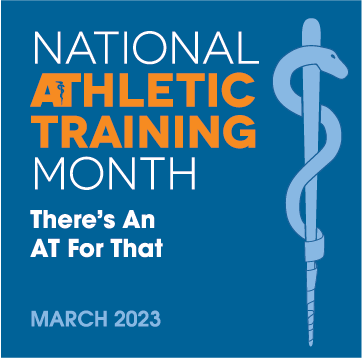March is National Athletic Training Month. Kent State Online offers an online Ed.D. in Interprofessional Leadership program with a specialty in athletic training. This concentration blends discipline-specific theory and practice strategies related to athletic training education.
Learn more below from Dylan Bradley, currently working on his doctorate in Kent State Online’s Ed.D. in Interprofessional Leadership program with a specialty in athletic training.
About Dylan Bradley, MS, LAT, ATC, CCHW
Hello everyone, my name is Dylan Bradley, and I work as a secondary school athletic trainer in northeastern PA through a health network in addition to being an EdD. student in the Interprofessional Leadership program. I completed my undergraduate stent at East Stroudsburg University where I studied athletic training. Following the completion of my bachelor’s degree, I attended Kent State University where I worked as a teaching assistant in the athletic training program. I received a Master of Science in Exercise Physiology/Athletic Training. I have a passion for education and mental health advocacy within athletics. When I am not working with the Panthers, I enjoy biking, kayaking, and listening to country music.
As an employee of a large health network, I actively work to become thoroughly integrated into the school district through sports medicine services, marketing, community health initiatives, and community outreach. As a Doctor of Education student and practicing clinician, the integration of the program curriculum into the clinical setting has provided me with invaluable growth in my clinical and non-clinical practice. The ability to apply theory to practice has elevated my professional skills and enhanced the patient care I am able to provide.
On a typical day in my life of me, I wake up around 7 am, check e-mails, complete some homework/coursework, and grab breakfast. Depending on the day, I usually have a meeting or two prior to heading to my school, so I attend those and complete any immediate tasks from the meetings that need to be done. I then get a quick workout in on my Peloton bike and get ready for the day. I typically head to my high school at 1 o’clock and depending on the day/sport season, maybe there until 8 or 9 pm at night. While at the school, I provide pre-practice/pre-event rehabilitation for injuries and complete injury evaluations and documentation. If a game or event is occurring, I am on-site to provide any immediate care that may be necessary. When an event is not occurring, I can be found rotating from practice to practice, checking in with athletes and coaches, supporting return-to-play programming, and addressing hydration needs. After practice/games, I clean up my equipment, complete any documentation needs, and prep for the next day.
Why Athletic Training?
Being an athletic trainer is extremely rewarding and fulfilling! Not only do you get to be courtside/field-side for so many sporting events, but you also get to be a healthcare professional while doing so. I love the secondary school setting because of the relationships you can develop with the student-athletes during such an important and memorable part of their life. In addition to the relationships, it’s extremely rewarding to see student-athletes overcome an injury and return to their sport or activity and know that you played an influential role in that process.
History of Athletic Training
The profession of athletic training has been around for over 50 years, but notably became recognized as an allied healthcare profession in 1991. Athletic trainers are highly skilled, healthcare professionals who provide services and treatments, under the direction of or in collaboration with a physician, in accordance with their education, training, and the state’s rules and regulations.
The profession of athletic training is extremely unique and unable to be compared to any other profession. Many people often confuse athletic training with personal training or strength and conditioning, but there are distinct education requirements, legal and state statutes, and clinical differences that exist between both professions. Athletic trainers are sports medicine professionals with advanced training and expertise in injury prevention, assessment and management of injuries, emergency care, therapeutic intervention, and healthcare administration.
Quick Facts about Athletic Training
- There are over 56,000 athletic trainers practicing in the United States.
- 49 states and the Commonwealth of District of Columbia have some requirements for practicing athletic trainers, including registration and/or licensure, apart from California.
- Athletic trainers can work in a variety of settings, with expansive growth most recently in the occupational medicine setting. Athletic trainers can be found in secondary schools, collegiate/universities, youth sports, physician practices, military and emergency response, research, and non-clinical roles such as academia and healthcare administration.
- The National Athletic Trainers Association (NATA) works to provide advocacy efforts and resources for the public, aspiring clinicians, and current athletic trainers.
- Athletic trainers practice under five domains of practice, which include:
- Injury and Illness prevention and wellness promotion
- Examination, assessment, and diagnosis
- Immediate and emergency care
- Therapeutic intervention
- Healthcare administration and professional responsibility
National Athletic Training Month
National Athletic Training Month is held every March in order to spread awareness about the important work of athletic trainers. In addition to providing logos, posters, press releases, sample media alerts, and PR toolkits, NATA also hosts several virtual engagement opportunities during the month-long celebration.
The 2023 slogan is “There’s an AT for That”. Learn more at nata.org.
Kent State University’s Online Doctor of Education in Interprofessional Leadership
The online Doctor of Education degree in Interprofessional Leadership promotes the study of leadership from an interprofessional perspective. Our approach is framed around questions of equity, ethics, and social justice and focuses on developing solutions to complex problems of practice. The program prepares leaders who can construct and apply knowledge to make a positive difference in the lives of individuals, families, organizations, and communities.
The Ed.D. degree in Interprofessional Leadership is cohort-based, starting in the summer term, with students taking three to five years to complete the degree. Students apply to a concentration for specialized study. Examples of cognates include special education, educational technology, curriculum and instruction, athletic training education, and cultural foundations of education.
The athletic training concentration provides graduate students the opportunity to prepare for the rigors of academic positions in a college or university by blending discipline-specific theory and practice strategies related to athletic training education. This degree program will provide the student with an opportunity to gain extensive knowledge in higher education while developing the critical skills necessary to establish a strong foundation in athletic training and educational leadership. A comprehensive project directly related to athletic training education will allow the student to address a contemporary issue in the profession through purposeful research strategies to generate educational change within the discipline.
For more information on Kent State’s Online Doctor of Education in Interprofessional Leadership degree, visit https://onlinedegrees.kent.edu/degrees/doctor-of-education-interprofessional-leadership






